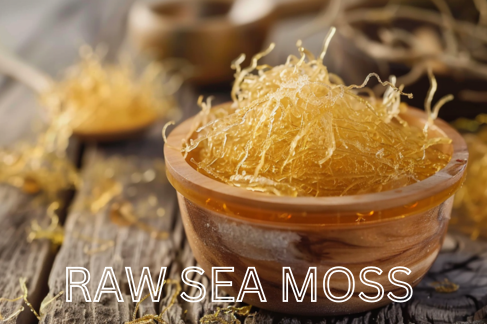Raw Sea Moss and Thyroid Disorders: Can It Help with Hypothyroidism?
Did you know that thyroid disease affects over 12% of Americans at some point in their life, causing symptoms like fatigue, weight gain, etc.? This condition occurs when the thyroid gland – a small, butterfly-shaped gland in our neck can’t produce and release enough amount of thyroid hormones.
The primary function of the thyroid gland is to speed up your body’s metabolism. It is of two types – Hypothyroidism and hyperthyroidism. It can affect people of all ages. While there are several medications to treat this condition, many people turn to natural supplements to support their thyroid health. One such popular natural ingredient that is gaining popularity is raw sea moss.
What is Raw Sea Moss?
Raw sea moss, also known as Irish moss, is a type of red algae found in the Atlantic Ocean, particularly along the coastlines of North America, Europe, and the Caribbean. It has been used for centuries in traditional medicine due to its rich nutritional profile, which includes a variety of essential minerals and vitamins. It contains iodine, calcium, magnesium, potassium, and vitamins A, C, and K. These nutrients are vital for maintaining various bodily functions, including supporting thyroid health.
How Does Sea Moss Support Thyroid Health?
Rich in Iodine for Thyroid Function
Iodine is a key nutrient required by the thyroid gland to produce thyroid hormones. These hormones, namely thyroxine (T4) and triiodothyronine (T3), regulate metabolism, energy production, and overall growth. Inadequate iodine levels can lead to hypothyroidism, where the thyroid gland fails to produce enough hormones. Organic sea moss raw is naturally rich in iodine, making it an excellent dietary supplement for individuals who need to boost their iodine intake. By providing the body with a natural source of iodine, sea moss may help support the thyroid in producing the necessary hormones.
Anti-Inflammatory Properties
Hypothyroidism is often associated with inflammation in the body. Chronic inflammation can exacerbate symptoms like fatigue, joint pain, and muscle weakness, making it harder for individuals with hypothyroidism to feel their best. Sea moss contains compounds that possess anti-inflammatory properties, such as omega-3 fatty acids. These fatty acids may help reduce inflammation, alleviate discomfort, and promote overall well-being in individuals with thyroid disorders. By addressing inflammation, sea moss may help improve the quality of life for those struggling with hypothyroidism.
Supports Overall Immune Health
The immune system plays a significant role in thyroid function, as autoimmune disorders, such as Hashimoto’s thyroiditis, are a common cause of hypothyroidism. Sea moss is rich in antioxidants and essential vitamins like vitamin C, which can help strengthen the immune system. By supporting immune health, sea moss may help prevent further damage to the thyroid gland, particularly in individuals with autoimmune-related thyroid disorders. Additionally, its high vitamin A content supports the health of mucous membranes, including those found in the thyroid gland, which can be beneficial for thyroid function.
Promotes Healthy Metabolism
A common symptom of hypothyroidism is a slowed metabolism, which can result in weight gain and fatigue. Organic sea moss is packed with essential minerals like magnesium and potassium, which are crucial for maintaining healthy metabolic processes. Magnesium helps regulate blood sugar levels and supports the production of thyroid hormones. Potassium, on the other hand, aids in muscle function and fluid balance, ensuring the body operates efficiently. By supporting these metabolic processes, it may help individuals with hypothyroidism manage their weight and maintain energy levels.
Supports Digestive Health
Another key benefit of organic sea moss for individuals with hypothyroidism is its ability to support digestive health. People with thyroid disorders, particularly hypothyroidism, often experience digestive issues such as constipation and bloating. Raw sea moss is rich in prebiotics, which helps nourish the beneficial bacteria in the gut. A healthy gut microbiome is essential for proper digestion, nutrient absorption, and overall gut health. By promoting digestive function, sea moss may help alleviate some of the uncomfortable digestive symptoms that are often associated with hypothyroidism, improving overall well-being.
Conclusion
Organic sea moss offers a range of potential benefits for individuals dealing with hypothyroidism. Its rich iodine content supports thyroid hormone production, while its anti-inflammatory, immune-boosting, and metabolism-enhancing properties can help alleviate common symptoms of hypothyroidism.
Additionally, its digestive health benefits further contribute to overall wellness. As with any supplement, it’s essential to use sea moss responsibly and consult with a healthcare provider to ensure it’s appropriate for your health needs. When incorporated into a balanced diet, sea moss can be a valuable natural ally in supporting thyroid function and promoting a healthier lifestyle.




